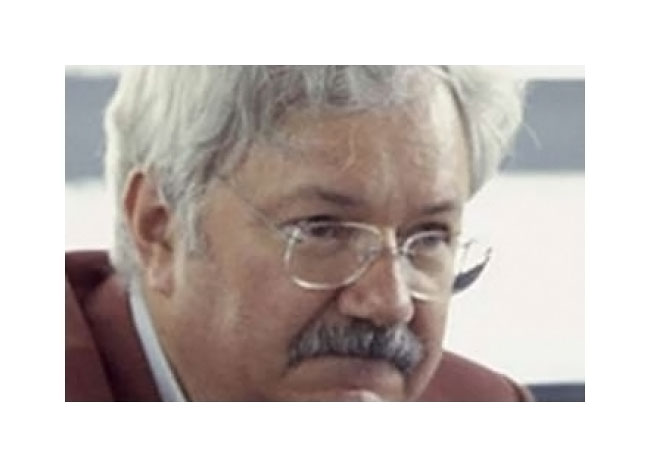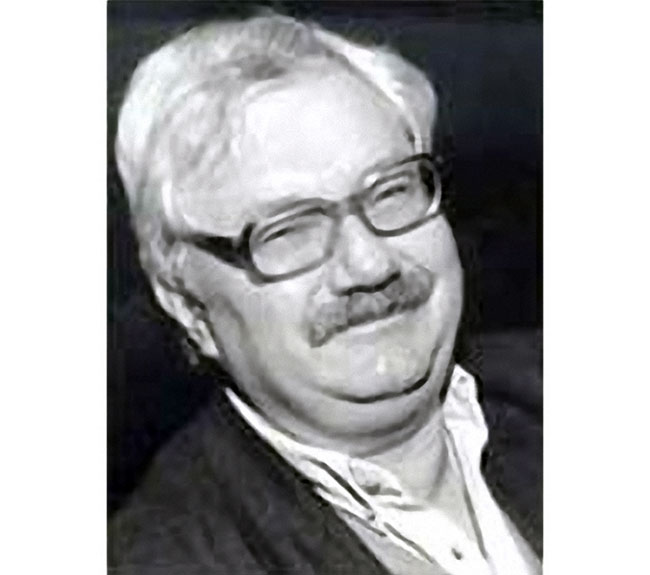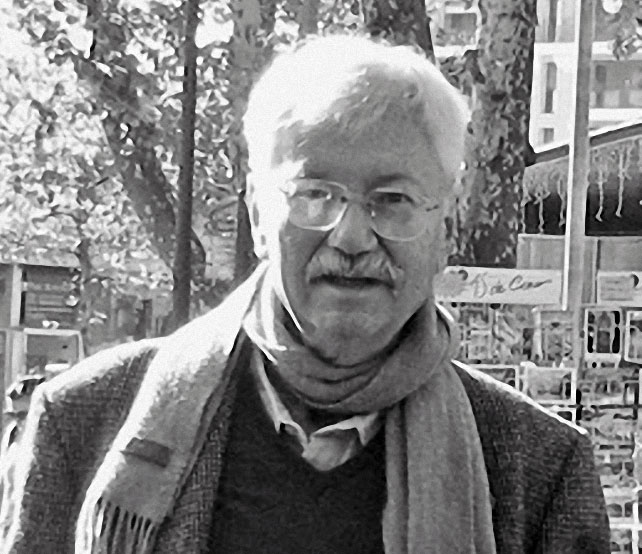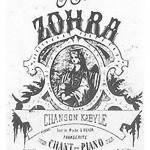Christian Poché, The Soul of Arab Music (1938-2010)
Adapted from the eulogy written by Jean Lambert
Christian Poché was a journalist, radio producer, music historian, and ethnomusicologist who dedicated his career mostly to studying the Arab World’s music, and succeeded in restoring it to its place of honour in a part of the world where it was starting to loose ground. His strong musical education and his linguistic skills allowed him to dive into the historical depth of this music and, armed with his encyclopaedic knowledge, he was able to communicate to his audience his love for foreign cultures. Christian Poché was born to an Austrian father in Aleppo, Syria and remained very strongly attached to this city his whole life. He spent part of his youth in Lebanon, where he was appointed General Secretary then Director of the Jeunesses Musicales (Musical Youths) from 1961 to 1969, and joined the Lebanese newspaper L’Orient-Le Jour from 1965 to 1967 as music critic. Following his studies in Germany, he worked as researcher at the International Institute for Comparative Music Studies in Berlin (1971-1974) and, at the same time, as co-editor of The World of Music magazine (1973-1974). Starting the mid-1970s, Christian Poché was appointed by Paris to collect music in Syria, Lebanon, Yemen (1972-1975), Mauritania, Mali, Senegal, Niger, Burkina Faso, Guinea, Benin, Rwanda, Djibouti, Comoros, Maldives, Cameroun, Sudan, and Qatar (1976-1984). This marked the beginning of a significant recording work with more than thirty productions and booklets. In 1985, he set up the exhibition La voix. Maintenant et ailleurs (The Voice, Now and Elsewhere) at the Georges Pompidou Centre. This exhibition is without a doubt the first major cultural event in France that showed, at once, the unity and diversity in world music. He also published numerous exhibition catalogues and vulgarization works, such as Musiques du monde arabe. Ecoute et découverte (Music in the Arab World. Listening and Discovering) (IMA, 1994). Christian Poché is among those who contributed to making of the disc a full-fledged scientific publication, following high standards, with numerous informative booklets as well as supporting booklets. His written works include most importantly his republications of archives: Archives de la musique arabe (Archives of Arab Music) (Ocora & IMA, 1988), Le Congrès du Caire de 1932 (The 1932 Cairo Conference)(IMA & BNF, 1989), Archives de la musique turque (Archives of Turkish Music) (Ocora 1995), three ambitious projects executed in collaboration with Bernard Moussali. He joined the team of the Institut du Monde Arabe (Arab World Institute) in 1985, two years before it was opened. Christian Poché played a crucial role in having music recognized as an essential part of the Arab Cultural Heritage.
He worked in parallel as producer of radio shows at France Culture and France Musique starting 1978, and created two weekly shows: « Vocabulaire des musiques traditionnelles » (Vocabulary of Traditional Music), and « Sanza » (January 2000 – June 2003)– that was renamed « Zambra » (2006 – June 2008). He had also collaborated to France Culture’s show « Les Vendredis de la musique » (The Fridays of Music).
Coming from a journalistic professional background, Christian Poché also developed an original career as a researcher. Rich with extensive knowledge of Arab Music, he published numerous encyclopaedia articles for Science de la musique (Science of Music) (Bordas, 1976), Encyclopédie de la musique (Music Encyclopaedia) (Robert Laffont, 1988), the Grove Dictionary of Musical Instruments (1984), and the Garland Encyclopaedia(2002).
Very close to the field, as well as to music matters that he remained impassioned with and passionate about, Christian Poché endeavoured to unearth rare recordings, forgotten musicians and old writings that had gone unnoticed. He published quality articles on women’s role in the History of Arab Music, on « the ambiguity of the mizmār », on the historian al-Tīfāshī, on the biography of Villoteau as well as the biography of Baron Rodolphe d’Erlanger (doing justice, in passing, to Arab musicologists who had served those while remaining out of the public eye). He also published several books, alone or jointly, on Arab-Andalusian music (1995), on the role of almees in dancing in Egypt (1996), gladly expanding his area of research to music and dancing in the other Mediterranean regions, specifically in a Dictionnaire (Dictionary) published in 2005. Towards the end of his life, despite being weakened by a long illness, he continued to work on several new projects, including one book –almost finished– on the myth of Ziryāb, considered to be the founder of Andalusian music, based on a critical rereading by late historian al-Maqarrī as well as in light of earlier authors such as Ibn Bājjah and al-Tīfāshī.
Christian Poché: Bibliography and Discography, Selected Works
Books
1994 Musiques du monde arabe : écoute et découverte. Paris : IMA, 75 p. ill., biblio., disco.,
CD encarte.
1995 La musique arabo-andalouse. Paris : Cité de la musique/Arles : Actes Sud, CD encarte.
1996 Les danses du monde arabe ou l’héritage des almées. Paris/Montréal : L’Harmattan, (avec Djamila Henni-Chebra et al.).
2000 Les musiques du monde arabe et du monde musulman. Bibliographie et discographie. Paris: Geuthner (en collaboration avec Jean Lambert et al.).
2005 Dictionnaire des musiques et danses traditionnelles de la Méditerranée. Paris : Fayard.
Articles
1965 « Vers une musique libanaise », Les Cahiers de l’Oronte [Beyrouth] 5 : 115-136 [version revue et augmentée (1969) dans Les Cahiers de l’Oronte 7 : 77-100].
1976 « Maqam », « Tanbur », in Marc Honegger : Science de la musique. Paris : Bordas.
1981 « Rythme impair et danse boiteuse », Cahiers musique culture mémoire : 97-101. Paris: Maison de la Radio.
1983 «David and the Ambiguity of the Mizmar According to Arab Sources», The World of Music XXV/2 : 58-73.
Sadie ed. : The New Grove’s Dictionary of Musical Instruments. London : Macmillan.
1988a « Proche-Orient », in Denis Arnold : Encyclopédie de la musique II. Paris : Robert Laffont
[Collection Bouquins] : 166-172 [traduit de l’anglais].1988b « Cercle, droite, quadrilatère comme représentation dans la musique arabe », Maghreb,
Machrek 123 : 246-255.
1989a « La musique arabe vue de France », Le Monde Arabe dans la vie intellectuelle et culturelle
en France. Paris : Ima : 121-131.
1989b « Le partage des taches : la femme et la musique arabe », Les Cahiers de l’Orient 13 :11-21.
1992 « Mohamed Abdelwahab », Encyclopadia Universalis (Paris), supplément : 518.
1993 « Un nouveau regard sur la musique d’al-Andalus : le manuscrit d’al-Tifashi », in Amnon Shiloah ed. : « El Encuentro de las Culturas Musicales Cristianas, Judias y Musulmanas en la Peninsula Iberica (Antes de 1492) »]. Tire a part de la Revista de MusicologiaXVI/1 : 19-31.
1994 « Djibouti : vers une défonctionnalisation de la tradition musicale », « Egypte : entre la chanson longue et la courte chanson », « Egypte: un élargissement de plus en plus pousse du champ musical », « Irak : du nationalisme musical aux sources mésopotamiennes », « Jordanie : a la recherche d’une musique », « Liban: vers un néoromantisme musical », « Pays du Golfe : de la frénésie sociale a l’accélération musicale », « La musique en Palestine », « Soudan : les avatars de la musique soudanaise », Syrie : l’arabisme musical syrien”, in CD-ROM Adib (Arab Data & Information Bank) [R. Boustani et Y. Gonzales-Quijano, dir.]. Paris : Plannim/Centre Culturel Hariri/IMA.
1995 « De l’homme parfait à l’expressivité musicale : courants esthétiques arabes au XXe siècle », Cahiers de musiques traditionnelles 7 : 59-74.
1996a « Nay d’autrefois, nay d’aujourd’hui », in Charles Tripp, dir.: Flutes du Monde. Du Moyen Orient au Maghreb. Belfort : Association Flutes du Monde : 52-54.
1996b « La musique arabe et l’eclatement des formes », Encyclopadia Universalis : 380-381.
1996c « Les archives de la musique arabe », Revue d’etudes palestinienne 8 [Paris] : 79-93.
2001 « Le Baron Rodolphe D’Erlanger : le mécène, l’artiste et le savant », introduction à la réédition de Rodolphe d’Erlanger : La musique arabe, six tomes. Paris : Librairie Orientaliste Paul Geuthner/Institut du Monde Arabe : 1-39.
2002 “Music in Ancient Arabia, between Archeological and Written Sources”, et « The Musical Life in Aleppo”, in Virginia Danielson, Scott Marcus, Dwight Reynolds eds: The Garland Encyclopaedia of World Music 6, The Middle East. New York/London: Routledge : 357-362, 565-572.
Discs (LP, CD)
1972 Musique traditionnelle sur bousoq : Matar Mohamed. 1 LP Alvares, C 468.
1973 Syrie : Islam Sunnite. 1 LP Emi-Odeon/Unesco (Atlas Musical), C064-17885.
1976 Zaidi and Shafi’i, Islamic Religious Chanting from North Yemen. 1 LP Philips/Unesco (Musical Sources) 6586 040.
1981 Lebanon 1. 1 LP Barenreiter-Musicaphon/Unesco (A Musical Anthology of the Orient), BM 30 SL 2030.
1988 Archives de la musique arabe (avec Bernard Moussali). 1 CD Ocora/IMA, C 558678.
1989 Congres du Caire 1932 (avec Bernard Moussali). 2 CD Bibliothèque Nationale/
Institut du Monde Arabe, ANP 88/9-188/9-111-11110.
1990a Musique kurde. CD Auvidis-Unesco, 8038 (réédition d’un LP publie en 1974).
1990b Syria. Alep, Rituel Islamique Zikr. 1 CD Auvidis/Unesco, D 8013 (réédition d’un LP
publie en 1976).
1990c North Yemen. 1 CD Auvidis/Unesco, D 8004 (reedition d’un LP publie en 1978).
1991 Grands maitres du zarb : Djamchid Chemirani, Iran. 1 CD Auvidis Ethnic, B 6752.
1992a Shivkumar Sharma. Raga Jog. 1 CD Auvidis, B 6766.
1992b Eglise Syrienne Orthodoxe : Liturgie d’Antioche. 1 CD Auvidis/Unesco D 8039. (reddition d’un LP publie en 1984).
1992c Muezzins d’Alep. 1 LP CD Ocora, C 580038 (reedition d’un LP publie en 1980).
1993a Egypte : Art vocal et instrumental du XXe siecle, Aicha Redouane (avec Habib Yammine).
1 CD Ocora, C 560020.
1993b Hommage a Abdelkrim Rais. 2 CD Institut du Monde Arabe/Blue Silver, 301-2.
19893c Turquie. L’Art vivant de Talip Ozkan vol. 1. 1 CD Ocora, C 580047 (réedition d’un LP
publié en 1980).
1994a Hommage a Sabri Moudallal. 1 CD Institut du Monde Arabe/Blue Silver, 303.
1994b Asie de l’Ouest et Afrique du Nord. 1 CD Ocora, C 560061.
1994c Asie du Sud. 1 CD Ocora, C 560062.
1995a Turquie. Archives de la musique turque, vols 1 et 2 (avec Bernard Moussali). 2 CD Ocora, C 560081 et C 560082.
1995b Beihdja Rahal. Musique arabo-andalouse, Nouba Zidan. 1 CD Med, AM2458.
1996 Algerie. Le diwan de Biskra. 1 CD Ocora, C 56008.
1998a Syrie-Syria. Le salon de Musique d’Alep. The Aleppian Music Room. 1 CD Le Chant du
Monde, CML 5741108.09.
1998b Matrouz. Le chant vivant des langues croisees, Simon Elbaz. 1 CD Al Sur, ALCD 245.
1999a Nawba. Hijaz al-msharki. Francoise Atlan, Abdelfattah Bennis, Nourredine Tahri.Abdelkrim Rais Andalusian Orchestra of Fes. Mohammad Briouel. 1 CD Erato, 3984-25499-3.
1999b La Simsimia de Port Said. Ensemble Al-Tanburah. 1 CD Institut du Monde Arabe, 321026.
2001 Soudan. Au royaume de la lyre. Osman, Gubara & Co. 2 CD Institut du Monde Arabe, 321036.037.





